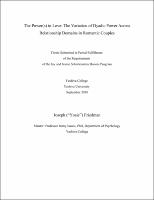Please use this identifier to cite or link to this item:
https://hdl.handle.net/20.500.12202/4346Full metadata record
| DC Field | Value | Language |
|---|---|---|
| dc.contributor.author | Friedman, Joseph ("Yosie") | |
| dc.date.accessioned | 2019-04-11T14:48:52Z | |
| dc.date.available | 2019-04-11T14:48:52Z | |
| dc.date.issued | 2018-09 | |
| dc.identifier.citation | The Power(s) in Love: The Variation of Dyadic Power Across Relationship Domains in Romantic Couples. Friedman, Joseph ("Yosie"). Thesis submitted in partial fulfillment of the requirements of the Jay and Jeanie Schottenstein Honors Program, Yeshiva College, Yeshiva University, May 2018. | en_US |
| dc.identifier.uri | https://hdl.handle.net/20.500.12202/4346 | |
| dc.identifier.uri | https://ezproxy.yu.edu/login?url=https://repository.yu.edu/handle/20.500.12202/4346 | |
| dc.description | The file is restricted for YU community access only. | en_US |
| dc.description.abstract | Based on previous findings in the social power literature and romantic relationships literature, we predicted that the power dynamics in romantic relationships would vary across domains rather than stay the same. In support of our prediction, we found that, for the majority of couples, actual power roles flip from one domain to the next and, furthermore, for the overwhelming majority of couples, power roles flip at least “half-way.” These findings suggest that multiple domain-specific power structures, rather than a single global power structure, govern dyadic relationships and, thus, that dyadic power is not an all-or-nothing construct. However, we failed to find parallel perceived power results in support of power variation. This study also investigated the association between power and the two power related constructs of gender ideology and relationship quality. Equitable divisions of actual power and perceived power were associated with more egalitarian gender ideologies and enhanced relationship quality. In addition, more traditional divisions of actual power were linked to men’s more traditional gender ideologies and women’s perceptions of more traditional divisions of power were linked to their holding more traditional gender ideologies. Finally, we found associations between how equal power is achieved and relationship quality: perceptions of “dividing and conquering” were linked to enhanced relationship quality for both sexes. When it came to actual power, the two sexes split in terms of their preferred method of balance such that females’ relationship quality was positively associated with balance achieved through dividing and conquering while males’ relationship quality was positively associated with balance achieved through collaboration. | en_US |
| dc.description.sponsorship | Jay and Jeanie Schottenstein Honors Program Mentor: Professor Jenny Isaacs, Ph.D., Department of Psychology, Yeshiva College. | en_US |
| dc.language.iso | en_US | en_US |
| dc.publisher | Yeshiva College. Yeshiva University. | en_US |
| dc.rights | Attribution-NonCommercial-NoDerivs 3.0 United States | * |
| dc.rights.uri | http://creativecommons.org/licenses/by-nc-nd/3.0/us/ | * |
| dc.subject | romantic relationships | en_US |
| dc.subject | social power | en_US |
| dc.subject | power dynamics | en_US |
| dc.subject | dyadic relationships | en_US |
| dc.subject | gender ideology | en_US |
| dc.subject | relationship quality | en_US |
| dc.subject | divisions of power | en_US |
| dc.subject | dyadic power | en_US |
| dc.subject | variation of power | en_US |
| dc.title | The Power(s) in Love: The Variation of Dyadic Power Across Relationship Domains in Romantic Couples. | en_US |
| dc.title.alternative | Thesis submitted in partial fulfillment of the requirements of the Jay and Jeanie Schottenstein Honors Program, Yeshiva College, Yeshiva University, May 2018. | en_US |
| dc.type | Thesis | en_US |
| Appears in Collections: | Jay and Jeanie Schottenstein Honors Student Theses | |
Files in This Item:
| File | Description | Size | Format | |
|---|---|---|---|---|
| Joseph Friedman Senior Honors Thesis 2018.pdf Restricted Access | PDF Rynhold OCR | 527.09 kB | Adobe PDF |  View/Open |
This item is licensed under a Creative Commons License

